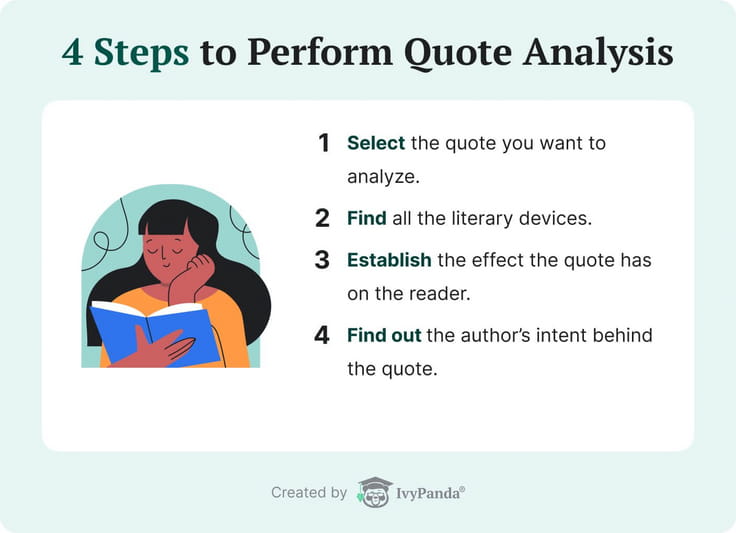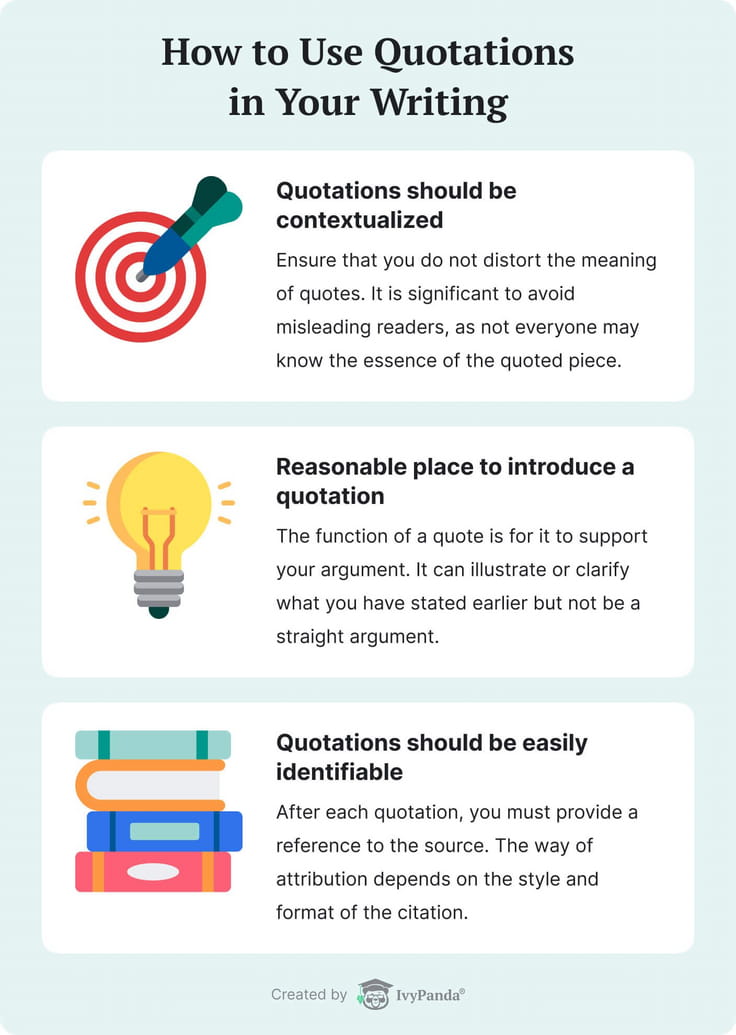Quote Explanation Generator
👁️🗨️ Intro to Our Quote Explanation Generator
A quotation is a direct repetition of someone else's words, enclosed within quotation marks, and attributed to the original author. You can use it to provide evidence, support arguments, or add authority to writing or speech.
Quote analysis involves examining a quotation's context, intended meaning, and implications. You should go beyond surface-level understanding, exploring the underlying ideas, emotions, and significance conveyed by the selected words.
Quotations hold the power to inspire, inform, and challenge us. Thus, we created a quote explanation generator – the ultimate tool for unraveling the depths of any saying! Whether you picked a random quote that sparked your curiosity or you have an analysis assignment, it’ll provide insightful explanations for each phrase.
3 Key Reasons to Try Our Quotation Explanation Generator
Sometimes, quotes have double meanings or a thick layer of context that’s difficult to get through. Our quote explanation generator lets you get to the heart of the matter without spending hours on this process. Several factors make our app a valuable tool in your academic pursuits:
👨🏫 7 Benefits of Quotations in Your Writing
To master the art of writing papers, you need a lot of practice. Producing volumes of bland text isn’t enough. Your work should be interesting to follow, and quotes are one of the best tools to improve the quality of your written assignments.

- Better persuasion. Any piece should ultimately get the reader to accept your argument. You can achieve this goal by adding the most impactful quotes in the body of the text.
- Connect text and sources. Sometimes your writing doesn’t connect data from cited sources to the ideas discussed in its paragraphs. A good quote or two can bridge this gap.
- Enhance your writing. Quotes can make your writing more subtle and creative. This way, the text becomes more interesting and less monotonous.
- Larger context. Adding quotes lets you better evaluate and discuss the topic. They expand on the context and give essential details to your piece.
- More credibility. Having quotes in your paper makes it more credible. It helps readers see that your arguments aren’t based merely on your opinions.
- A touch of sophistication. Quotes are a great way to make your paper more sophisticated. It will lead to higher grades from your professors.
- Stronger arguments. Adding quotations lets you better introduce arguments and analyze ideas.
✨ How to Perform a Good Quote Analysis
Finding the core meaning of sayings can enrich your written assignment. In this segment, we’ve prepared a step-by-step guide to analyze quotes and uncover their potential. These guidelines will help you evaluate any quotes you can come across.

- Step 1. Select a suitable quotation. Add the ones relevant to your paper’s subject. It should relate to either a person or an argument. Better use short citations to save time on analysis.
- Step 2. Identify literary devices. Take a look at the choice of words in the quote. Pay attention to personifications, similes, metaphors, rhythm, alterations, and other devices. It helps better understand what the author tried to say.
- Step 3. Establish the effect of the quote. Assess how the literary devices and additional techniques affect the quote. Experiment with different interpretations and consider which one is the most convincing.
- Step 4. Find out the author’s intent behind the quote. Additionally, consider why the author chose to phrase their words in a certain way. For example, state if the quote has multiple meanings to keep it ambiguous deliberately.
🔎 Quotation Types & Examples
During your detailed research, you might come across different kinds of quotes. There are three common ways of formatting a quotation in a piece of writing. We’ve decided to make a short guide that helps differentiate between them:
Integrating Quotations into Sentences
Knowing how to correctly incorporate quotes into your text is an essential skill that helps improve the value of your work. This section contains practical tips that make this process easier and enables you to create more credible writing.

- Introduce the quote with a colon and a complete sentence. It’s the most common use of a quotation that involves marks at the start and end of a quote. For example, in the words of Shakespeare: “We know what we are, but know not what we may be.”
- Provide an explanatory or introductory phrase separate from the quotation with a comma. Here, you give a bit of context to explain a quote better. In The Picture of Dorian Gray, Oscar Wilde writes, “Nowadays people know the price of everything and the value of nothing.”
- Make the quote a part of your sentence without additional punctuation. In this instance, the quotation becomes a part of your writing. For example, Dostoevsky argues that “conscience without God is a horror. It can get lost to the most immoral.”
- Use several words from the quote in your sentence. It works the same as the previous example, although with smaller bits of the quotation. Duma’s advice to “wait and hope” runs throughout The Count of Monte Cristo.
🏆 Great Example of Quote Analysis
Here we've prepared an analysis of Les Brown's inspirational quote, “Shoot for the moon. Even if you miss, you will land among the stars.” This sample can inspire you to write your own essay on quote analysis; take advantage of our generator and tips!
We did our best to provide a comprehensive guide on quote analysis. After you check out our specialized tool, please take a look at our FAQ section. Lastly, if you need help analyzing other types of text, try our rhetorical analyzer.
❓ Explain the Quote Generator – FAQ
Updated:
🔗 References
- Suggested Ways to Introduce Quotations. – Columbia College
- Integrating a Quotation into an Essay. – Kelly Johnson, Ursinus College
- 5 Steps to Quote Analysis. – Luna Laliberte, Rutgers, The State University of New Jersey
- Quotation Analysis for Source Use. – Amanda Hardman, Red Rocks Community College, RRCC
- Working with Quotations. – Empire State University
- Quote Integration. – University of Nevada, Reno